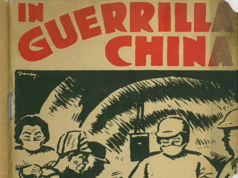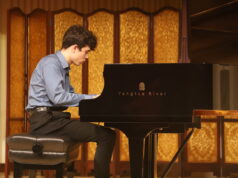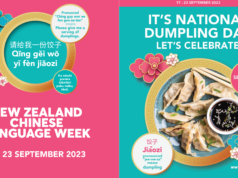On October 10th this year, being sofa-bound after hip surgery, I watched the celebration in Beijing of the 110th Anniversary of the 1911 “Xinhai Revolution”.
In the old Chinese calendar, years were counted in 60year cycles, with a 2-character name assigned to each year according to the Heavenly Stem and Earthly Branch of its place in the cycle. 1911 was the ‘XinHai” year in this system. (Thank you Michael Wang Yuchuan of Hamilton for this note.)
In October that year, the dedicated revolutionary Dr Sun Yatsen, who had been educated in Hawaii and studied Western medicine in British Hongkong, was away in the US raising funds among overseas Chinese for yet another uprising against the hated Manchu Qing Dynasty.
On Oct 10th, troops mutinied at Wuchang in Hubei Province, sparked by public outrage against the Dynasty’s theft & sale of railways that the middle classes had fund-raised to build.
The rebellion was cruelly put down in Hubei, but numerous Provinces followed suit, the 6-year-old Emperor Pu Yi was forced to abdicate, and progressive groups called Dr Sun back to China to become President of the newborn Republic of China, based on his “Three People’s Principles” – National Sovereignty, Democracy and People’s Livelihood. These were his consistent platform to grow China’s democracy, from November 1905 onward, when he set up the “MinBao” newspaper. He later summarised them as “Independence for the Nation, Democratic Freedoms for the People, and People’s Happiness” (meaning decent livelihood for all.)
Naively, Dr Sun first sought economic help for his democratic state from the Western powers. But they derided him for thinking that they would give up their illegal powers in China. The only country to cancel its imperialist “unequal treaties” was Soviet Russia after its October Revolution in 1917.
In recent years, Chinese researchers have discovered that Sun began studying Marxism and Socialism while in exile in London in 1897. He identified himself as a Socialist from then on, and around 1903 he apparently sought membership for China of the “Second International” in Brussels, centre of the world Socialist movement at that time.
How many New Zealanders nowadays have any idea of the “Crises of Capitalism” driving many European countries (and ours) toward Socialist revolution at the turn of the 20th century? In fact Sun was respected by Lenin and the Bolsheviks precisely because his movement toppled the world’s longest-entrenched absolute monarchy, in the world’s poorest country, comprising a quarter of the human race – even before they achieved that in their own country!
Many of Sun’s phrases are still used by China’s Communists. One in particular illustrated what he was up against; “China is a dish of loose sand.”
The penury, chaos & corruption resulting from the “Century of Humiliation” saw Sun being forced to resign the Presidency in favour of Yuan Shikai after only 6 months. In the intervening years he was hunted & harassed by one warlord after another, and the Revolutionary Government at Guangzhou was in constant danger. But as the Soviet Government had recognised his Republic, Sun had access to Soviet diplomats, & European advisers from the Comintern.
They helped him set up the Huangpu (Whangpoo) Military Academy, to train officers for a Nationalist Revolutionary Army. He also set up the Peasant Movement Institute to train cadres for Land Reform, with Mao Zedong as Director. And the Russian advisors persuaded him to allow members of the infant Communist Party to join his Guomindang (Nationalist) Party. So among other important roles, Mao was appointed to help draft the Nationalist Constitution at their first National Conference in January 1924!
Lenin died during that Conference. Sun as President ordered national mourning, and eulogised Lenin as “the people’s teacher” and “our best example”. The research I’m using, “Hardwon Glory” published 2013, and points out that Soviet Russia and Revolutionary China were painfully isolated internationally, so they were very dependent on each other. This explains Sun’s decision to accept Soviet support and allow Communists into his Party and Army. As this book points out, “a great anti-imperialist, anti- feudal- warlord Revolution was beginning”.
Sadly, Dr Sun too died on March 12 1925. But his last will, written with Soong Qingling steadying his hand, was: “The Revolution has not yet succeeded, My comrades must fight on”.
The “Great Revolution”, as the Chinese call it, proceeded apace. The intent was to muster all progressive forces, march north from Guangzhou, expel foreign armed forces, suppress all warlords and unify the Republic. The Generalissimo of the National Revolutionary Army was one Jiang Jieshi – Chiang Kaishek.
Meanwhile, in distant Moeawatea, New Zealand, a Returned Serviceman- turned- farmer named Rewi Alley was reading about all this (presumably from the British colonial perspective) in the Auckland Weekly News during 1926. He decided to “go to China and take a look at that Revolution of theirs”, arriving at Shanghai in mid-April 1927. Just 2 weeks earlier, the National Revolutionary Army had arrived at Shanghai, where Communist cadres under Zhou Enlai had mobilized the workers to take over the factories and welcome the Army’s takeover of this bastion of Western exploitation.
On April 12, Chiang secretly mobilized his brutal old mates from the gangs of the Shanghai underworld, who turned on the worker pickets and began a massacre of anyone remotely suspected of being ‘Leftwing” which spread throughout the country. So much for his loyalty to Sun’s legacy!
Soong Qingling, as Dr Sun’s respected widow and “Mother of the Nation”, condemned Chiang, withdrew from his Party and formed the Revolutionary Guomindang.
And so began the Chinese Communist Party’s long, bitter struggle for survival, the founding of the Red Army, the Long March, the Anti-Japanese War 1931-45, the Civil War 1945-49 and Chiang’s departure for Taiwan.
Rewi Alley met Soong Qingling in 1933, and was co-opted by her into support for the CCP and other progressives against the Guomindang and the Japanese invaders, along with the NZ Rhodes Scholar newspaperman James Bertram, whose interview with Mao at Yenan is in Mao’s “Collected Works”. Rewi also helped smuggle Soong to Hongkong when the Japanese took Shanghai!
They worked untiringly for China’s causes throughout WW2, then on until Liberation in 1949. Rewi remained in Beijing, and was later slandered by the Western media for his support of China during the Korean War, and his truthful reporting on people’s movements worldwide, including the superpowers’ nuclear threats against China & Vietnam.
A lovely book about the friendship between Rewi and Soong Qingling has recently been published by the Shanghai Soong Qingling Research Society. I fervently hope it will soon appear in English, so more Kiwis can inform themselves of the facts of China’s past, better understand her present and share in her future. China’s leaders still recall Sun Yatsen’s words;
“The tide of the world, a mighty surge. Follow it and thrive, thwart it and die.”
Jan McLeod




